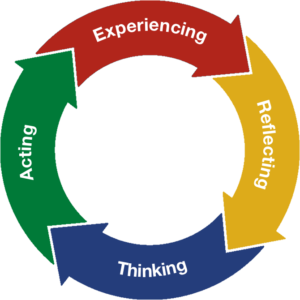In this blog, I will answer and explain the following questions about experiential learning: what is experiential learning? what are its characteristics? Does experiential learning apply to our topic? The reason why I pick experiential learning theory as my approach to the learning environment is that it focuses on how does a person understands the learning process, and the learning process is very important to learners.
What is experiential learning?
Experiential learning is a learner-centered, contextualized learning style, which requires a combination of practice and reflection to acquire desired knowledge, skills, and attitudes. Students will acquire knowledge or skills through reading, attending lectures, research or practice. The role of a teacher is no longer to impart knowledge unilaterally, but more importantly to make use of visual, audible, and sensible teaching media to prepare students for the beginning of the experience. Through this learning theory, Students will have an impulse to learn and voluntarily devote themselves to the learning process. Moreover, “Experiential learning describes the ideal process of learning, invites you to understand yourself as a learner, and empowers you to take charge of your own learning and development.” (Institute of Experiential Learning, 2021.)
What are experiential learning’s characteristics?
“The mission of the Institute of Experiential Learning is to commit to releasing the untapped potential in individuals, teams, and organizations through the deliberate and transformative process of experiential learning.” (Institute of Experiential Learning, 2021.) Experiential learning is formed by four steps of the learning cycle: Experiencing: Immerse yourself in the real experience of the place and the time.->Reflecting: Observe and think about actual experiential activities and experiences from multiple perspectives -> Thinking: Develop logical concepts and theories through observation and thinking -> Acting: Use these theories to make decisions and solve problems, and verify their new concepts and theories in practical work. Experiential learning enables learners to know the things around them through practice and enables learners to become the protagonists of the class by making them completely participate in the learning process.

Does experiential learning apply to our topic?
I think experiential learning fits our topic “Introduction to Python” in some ways. First, students will have their chance to observe other people’s Python programs and simulate the code, this learning process is very effective and common in computer program learning. Second, students will observe and reflect on their code works and find errors from them, which will enable them to complement their knowledge of Python. Third, students will come up with their own idea of program writing through steps of experiencing and reflecting. Finally, students will use the Python theories they learned to make procedural decisions and solve code problems, they will refine their understanding of Python and practice number crunching over and over.
Below is an introduction of experiential learning in a video way:
References:
Institute of Experiential Learning. 2021. “What Is Experiential Learning?”. Institute of Experiential Learning. https://experientiallearninginstitute.org/resources/what-is-experiential-learning/
Hi Zhiwen,
Thank you for your insightful take on experiential learning. It really is only when you physically do and practice the learning task that you understand yourself as a learner. I also like how you said that experiential learning empowers you to take charge of your own learning and development because when you decide to physically practice a task, you are in control.
I think that experiential learning would be a great learning approach for your group’s Interactive Project and I am excited to see what your group creates!